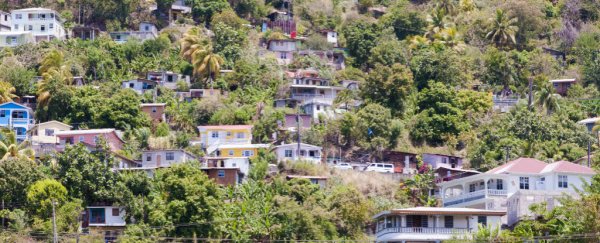Not only can trees provide us with oxygen to breathe and help combat the effects of global warming at the same time, their presence has also been linked to our risk of heart disease, a new study has found.
A team of scientists has been analysing the health effects of a lack of foliage, specifically in the city of Detroit, where the emerald ash borer (EAB) beetle has been ripping through trees and causing havoc to the local ecosystem. Based on data pulled from the Women's Health Initiative survey, those in EAB-ravaged areas were 25 percent more likely to suffer from certain kinds of cardiovascular disease.
What makes the data so valuable to researchers is that the EAB beetle has no respect for neighbourhood boundaries or the ages of local residents: because the damage has been so indiscriminate, there's a greater chance that the trees are the root cause of the discrepancies in health.
"Taking into account all research, not just my own, I'd say that there is strong but not definitive evidence linking trees and improved public health," lead researcher Geoffrey Donovan from the US Department of Agriculture told Ben Schiller at Fast Company. "I imagine that there is an upper limit [to the number of trees we need], but I think we're a long way from that point."
What the researchers aren't sure of is why this link exists, but they have some ideas: they think trees might reduce air pollution, encourage exercise, reduce stress, or encourage social interaction (or all four together). When you add up the potential effect of all these factors, the report's findings don't sound so surprising.
"If tree loss has negative health consequences, then, intuitively, it would seem reasonable to conclude that planting or retaining trees would have a positive impact on public health," concludes the report. "However, little is known about the mechanisms linking trees and cardiovascular disease, so our results should be interpreted with caution."
As this new study notes, plenty of prior research has pointed to the health benefits of living near trees. In August, a study suggested that having more trees on your street could make you feel several years younger and have the same health benefits as a substantial pay rise.
"When they compared the two datasets, and controlled for factors such as income and age, they found that 10 extra public trees on a block made people feel 1 percent healthier - the same increase as earning $10,200 per year more, moving to a neighbourhood that's $10,000 wealthier, or being seven years younger. The researchers didn't just look at self-measured health either, when they reviewed data on cardio-metabolic conditions such as obesity and heart disease, they found that the health benefits of 11 extra trees were equivalent to earning $20,200 extra a year."
If your boss is unlikely to approve more money in the near future, a leafy suburb might be your only option.
